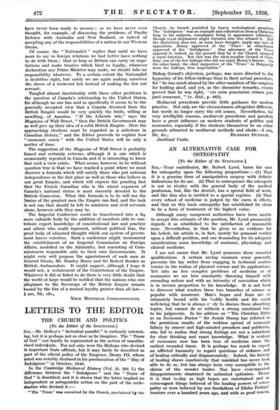LETTERS TO THE EDITOR
11-114, CHURCH AND POLITICS
[To the Editor of the SPECTATOR.]
Srn,—Mr. Helbey's "historical parallel?' is curiously interest. lug, but it is perhaps not so close as he imagines. The " Truce of God" can hardly be represented as the action of unautho- rized indivi4uals. For not only were the Bishops who devised it important State officials, but it may fairly be described as part of the official policy of the Emperor, Henry III, whose mind was notably disclosed in his proclamation of the " Day of Indulgence" in October, 1043.
• In the Cambridge Mediaeval History (Vol. iii. 281 f.) the difference between the " Indulgence " and the "Truce of God" is described, and it is shown that the latter implied no independent or antagonistic action on the part of the eccle- siastics who devised it :—
' " The 'Truce' was conceived by the Church, proclaimed by the
Church, its breach punished by heavy ecclesiastical. penalties. The Indulgence ' was an example and exhortation froma Christian Wog to his subjects, compliance being in appearance voluntary, though royal displeasure might threaten him who refused it. But the distinction does not, as some have thought, imply any sort of opposition. Henry approved of the 'Trues' as churchmen approved of the 'Indulgence.' One adversary of the Truce opposed it, indeed, on the ground that by it the Church usurped a royal function. But this was the ultra-royalist Gerard of Cam, bray, one of the few bishops who did not enjoy Henry's: favour. on the other hand, the chief supporters of the Truce in Burgundy were the bishops, firm imperialists."
Bishop Gerarcrs objection, perhaps, was more directed to the hypocrisy of his fellow-bishops than to their actual procedure, for" he was much abused by the other members of the congress for holding aloof, and yet, as the chronicler remarks, events proved that he was right,'viz enim paucissimi crimen per- jurii evaserunt., " (v. Ibid., p. 465).
Mediaeval precedents provide little guidance for modern practice. Not only are the circumstances altogether different, but words no longer carry the old senses. Nevertheless, for very intelligible reasons, mediaeval precedents and parallels have a great influence on modem students of politics and economics, especially if the students themselves be on other grounds attracted to mediaeval methods and ideals.—I am,














































 Previous page
Previous page